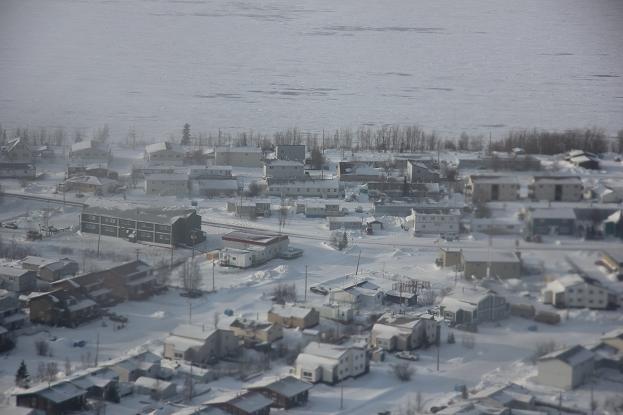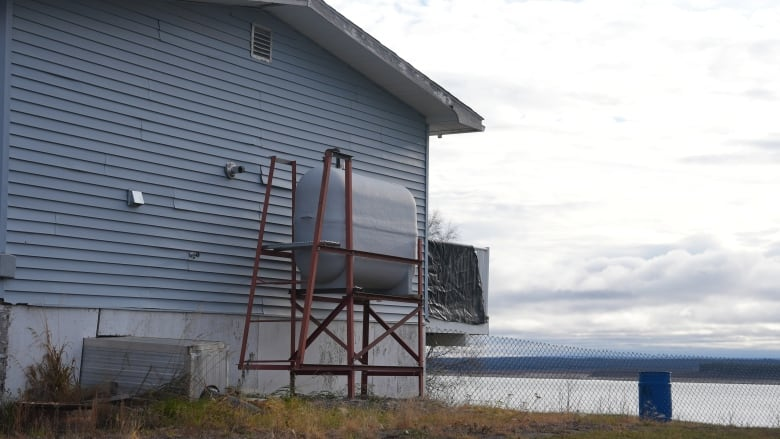As fuel prices soar in Norman Wells, N.W.T., locals demand answers from Imperial Oil

‘Somehow the numbers for us just aren’t adding up,’ said the president of North-Wright Air
As Norman Wells, N.W.T., is gripped by a cost-of-living crisis driven by high fuel costs, local business owners and leaders have some questions for fuel supplier Imperial Oil.
Joshua Earls is the owner of Ramparts, one of the two grocery stores in the 750-person community.
He was one of many Norman Wells residents who attended an emergency council meeting Wednesday to discuss how to respond to extremely high fuel prices seen in the community in recent weeks.
Residents have reported home heating fuel prices have risen to more than $5 per litre.
Earls said residents and local business owners had a lot of questions for an Imperial Oil representative who attended about 20 minutes of the meeting by video call.
“We kind of just asked questions [about] what exactly was going on,” he said. “Why are fuel prices going up so significantly? What was done in terms of planning?”

All fuel in Norman Wells is supplied by Imperial Oil and distributed by local resellers.
The company has said recent increases in the prices of gasoline and heating oil reflect the cost of bringing fuel into the town by plane, which it has been forced to do after barges into the community were cancelled this past summer.
At the meeting, the Imperial Oil representative said fuel transportation costs are $3.40 per litre.
Earls said one of his biggest questions was why Imperial Oil didn’t attempt to bring in more fuel on the winter road last year to offset potential shortages caused by summer barge cancellations.
“This past winter, we knew the water did not look like it was going to be raising at all, and so at that point, personally, I ended up bringing up a year’s worth of supplies [on the winter road],” he said.
North-Wright Air president Travis Wright, who also attended the meeting, had another concern — that Imperial Oil might not be getting Norman Wells residents the best price possible for fuel right now.
“We’re in the aviation world as well. We know what things cost to fly. Somehow the numbers for us just aren’t adding up,” he told CBC after the meeting.
He said his company is exploring the possibility of chartering a plane full of oil drums to heat their staff housing, because they believe it might be cheaper than continuing to obtain heating oil through Imperial Oil.

Despite that, Wright was hopeful the Town of Norman Wells will be able to work with Imperial Oil to find ways of bringing down current prices and avoid fuel shortages in the future.
Norman Wells senior administrative officer Cathy Clarke has also sent Imperial Oil an email with questions about how the company arrived at current prices and what they would need to bring more supplies in on the winter road based on Wednesday’s meeting. Those questions were shared with CBC News.
“Certain businesses are seeing a distinct discrepancy between their freight costs and the costs presently being loaded ‘down’ to the Norman Wells consumer. Why the discrepancy?” reads one of the seven questions in the email.
Norman Wells Mayor Frank Pope said Friday the town was hoping to receive responses to their questions by Monday at the latest.
CBC News requested an interview with Imperial Oil in Norman Wells Thursday, which the company declined.
In a written response, a spokesperson said the company moved more fuel to Norman Wells by the winter road during the 2023/24 season compared to other years, but did not provide additional details.
Related stories from around the North:
Canada: Tarquti Energy, Hydro-Quebec deal important step towards green energy for Nunavik, Inuit leaders say, Eye on the Arctic
Finland: Lapland among regions not in favour of wind power compensation for eastern Finland, Yle News
Norway: Will the green transition be the new economic motor in the Arctic?, Eye on the Arctic
Sweden: Electricity prices climb in Sweden as Russian gas pipeline goes offline, Radio Sweden
United States: Alaska’s Northwest Arctic Borough gets $2 million tribal energy grant, Alaska Public Media



